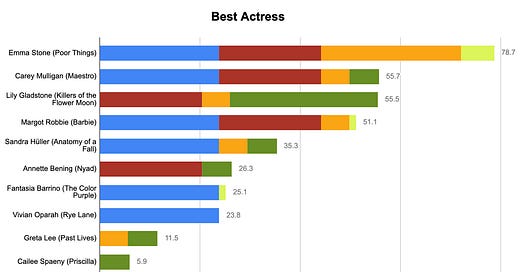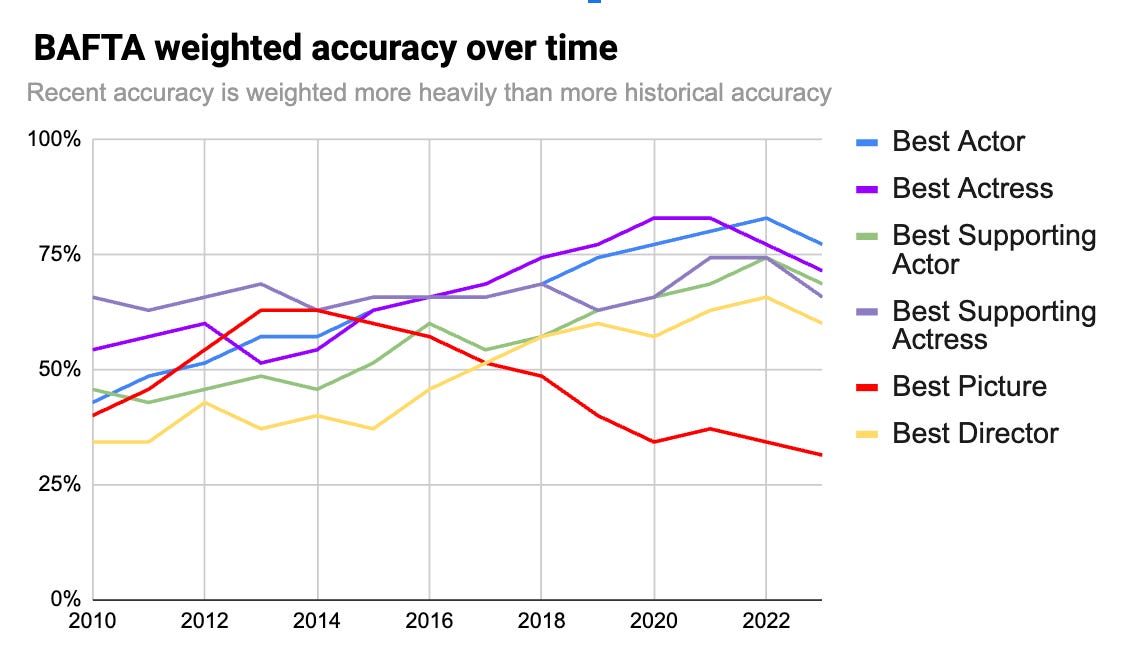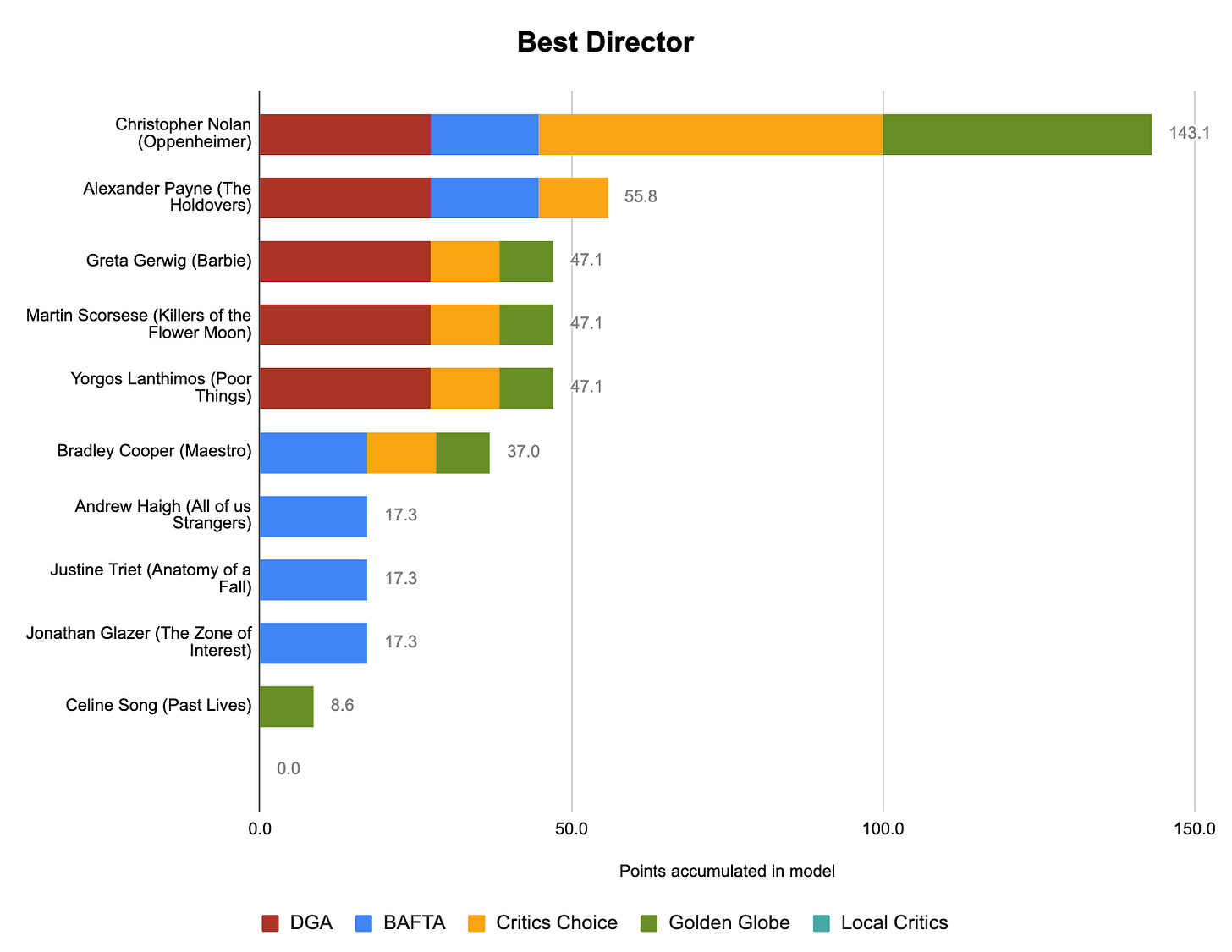Numlock Awards: Where the Oscar race stands right now
Lots of Oppenheimer on the board, but there's still a lot more race to come.
Numlock Awards is your one-stop awards season newsletter. Every week, join Walt Hickey and Michael Domanico as they break down the math behind the Oscars and the best narratives going into film’s biggest night. Today’s edition comes from Walter.
Hello, and welcome back to the Numlock Awards newsletter. Today we’ve got a fresh batch of forecasts for you, now that the guild nominations are mostly out, the critics’ awards are mostly done, the Academy has finished voting on nominations, and the nominees come out in just a few days.
How we do this!
First up, for our new readers, here’s what we do here. If you’ve been here before, or don’t care about the process, just jump on down to the next section.
The conceit is that in general, the awards that happen before the Oscars — what we call precursors — tend to inform what happens on Oscar night.
The manner in which precursors inform what happens on Oscar night varies. Sometimes, it’s direct, like when people who vote for both the Oscars and some guild award (like SAG, PGA, WGA or the DGA) are in both voter bases. Other times, it’s indirect, like when critics’ groups pick winners. Even though critics are not typically Academy votes, they can provide an accelerant to a campaign and signal things about taste.
We assign every Oscar precursor a score. The base of the score is the rate of how often it’s picked the same winner that the Academy did over the past 20 years. More recent predictive performance is valued significantly higher, because of the way the composition of the Academy has changed in just the past ten years. Specifically, the past ten years have 2 times the weight of the typical year, and the past 5 years are upped to 3 times the weight.
That weighted average of correct calls is then squared and multiplied by a hundred. If it’s a Guild Award or BAFTA or the like, the weight is doubled. This is the final score.
Contenders nominated for a given precursor get a fifth of the final score. Contenders that win a given precursor get the entire final score. Their overall score is the sum of the various applicable precursor awards.
Where we’re at now
Today, we’re at the point in the season where most major guilds have announced nominations and for the most part all the major televised critics’ groups have announced their winners. Last week, the Academy members finished voting for their nominations. Today, I’ll go through how the model currently assesses the field, with the caveat that the smaller critics’ groups — which are annually a bit of a pain to maintain the database, which this year led me to just remake the database, a slightly tedious process I’ll finish soon — are not yet updated.
Also, thanks to everyone who reached out after my Golden Globes post wondering about if the significant voter overhaul that body has engaged in makes it not useful for our purposes here. After conversations with a few people whose opinions I really respect on this stuff, I’m keeping the Globes in, at least for now. Philosophically, I think the best way to make modeling decisions for this stuff is to make them decisively and deliberately, and I just don’t have enough confidence that the Globes are any more useless than they were a few years ago.
Best Actress
We have a real race here, and this is going to be the fun category this time around. A solid competitive win at the Critics’ Choice Awards puts Emma Stone (Poor Things) in pole position here, and a surprise BAFTA snub for Lily Gladstone (Killers of the Flower Moon) appeared to take a bite out of her earlier momentum. Carey Mulligan is reliably getting nominations on the board, but we’re going to need to see her bag a win before calling that momentum.
Just a reminder on BAFTA as we go forward, they recently started doing a funky thing where their six nominees are the three most-voted for nominees during the longlisting process, followed by three nominees selected from a longlist by a jury. This is one explanation I tend to have for why half of the nominees are just what everyone else is consistently nominating, and half of them tend to be picks with less of a track record in other precursors. This is one reason why this newsletter doesn’t bother with predicting nominees, but if you were to try to figure out what the fifth nominee is after the four that have been reliably nominated all year, I wouldn’t over-weight BAFTA. Furthermore, I’d argue Gladstone’s overall positioning is probably stronger than it appears today.
Playing this out a bit, this is probably going to be the category to watch this season, and it’ll be exciting to see.
Best Actor
So far we’re in a two-person race, and Paul Giamatti’s (The Holdovers) win at the Critics’ Choice Awards and Cillian Murphy’s (Oppenheimer) win for Drama at the Golden Globes are making them the two main contenders. The model does not give a crap about Giamatti’s Golden Globe for Comedy — you will literally have to squint to make out how much the model cares about his recent win.
Four men have been nominated everywhere that counts — Bradley Cooper (Maestro) and Colman Domingo (Rustin) beyond Giamatti and Murphy — and the fifth nominee is probably between Barry Keoghan (Saltburn), Leonardo DiCaprio (Killers of the Flower Moon) and Jeffrey Wright (American Fiction). I personally actually am leaning a bit toward Wright getting the nod here, given beyond his role in American Fiction he’s had a rather productive year in other contending films such as Rustin and Asteroid City.
Bradley Cooper’s continued presence here is, bluntly, extremely important to me. Not because of the performance or whatever, but because my single-most anticipated in-development property right now is Bradley Cooper’s Hyperion adaptation, and the longer he spends on the awards circuit the more likely he is to cast the movie well. Does a BAFTA nod mean that he’ll brush elbows with David Mitchell and correctly cast him as Martin Silenus? Will he meet Elizabeth Debicki at the SAG Awards and cast her as The Shrike? These are of fundamental importance to me.
Best Picture
Oppenheimer is in the lead, but it’s still very much an open race. The critics prizes we’ve seen so far are just a pittance of the eventual points available on the board, and a win at any of the three major guild awards can wipe wins there out overnight. Three films — Barbie, Killers of the Flower Moon, and Oppenheimer — have been nominated at each of the three major guild awards, and Killers and Oppenheimer both got a BAFTA nod.
For Barbie fans and fans of films snubbed by BAFTA in general, don’t fret: BAFTA has been absolutely declining in predictive merit.
It’s actually kind of remarkable to see, when I first started predicting this stuff in the 2014 Oscars they were damn near reliable, especially when compared with the PGA, DGA and SAG, you could call them a peer. But for almost the entire time I’ve been doing this, in Best Picture BAFTA has gotten worse and worse every year. I blogged about this a little bit last year, if you want to read more on why I think that is.
Best Supporting Actor
So far it’s all Robert Downey Jr. (Oppenheimer). He’s nominated in all the important races at SAG and at BAFTA. A win at either of them will make him the frontrunner on Oscar night.
Beyond Robert De Niro (Killers of the Flower Moon) and Ryan Gosling (Barbie) there really isn’t a lot of agreement over what this category will end up looking like. For the reasons I caveated above, I put way less stock in the contenders that are nominated for BAFTAs and nothing else.
Best Supporting Actress
Again, so far it’s all Da’Vine Joy Randolph (The Holdovers) with Danielle Brooks (The Color Purple) and Emily Blunt (Oppenheimer) as the only other reliable fixtures in this category. As with Best Supporting Actor, I don’t trust the BAFTAs to be reliable indicators of support for nominations given their jury-based system for half the nominees, so this is going to be a bit of a jump ball for the last two slots.
Does Andrea Riseborough have anything out?
Best Director
Nolan. Doesn’t look particularly controversial yet. Alexander Paine (The Holdovers) is the only guy even competing against him in every future category. A win at either of them makes Nolan the frontrunner. It’d require both of the awards breaking in a different direction to make this a real race. Not that I’m a real narrative-driven guy, but that seems improbable: both the BAFTAs declining to recognize Local Boy Makes Good in the year where he seems to have the momentum and DGA declining to give one of the most successful auteurs of his generation a win for the fifth consecutive time, that would be pretty weird to me.
Lots of fun stuff to come this season, including a new look at the composition of the Academy, a dive into some rather concerning elements of the Academy’s finances, and more.









I want The Holdovers to win so badly, but it’s looking like an Oppenheimer sweep.
Nice Oscar 'potentials' write up. Posted a link on my Mastodon account.
https://vmst.io/@drrjv/111790755110983899